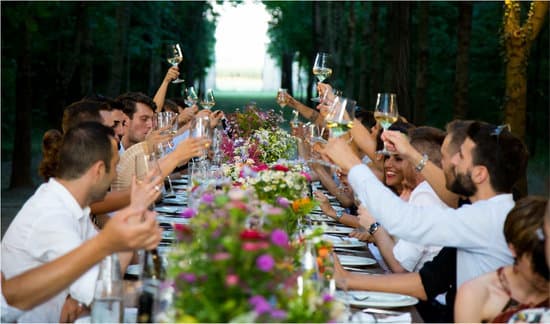Planning a wedding involves a multitude of decisions, and one of the most important factors to consider is the timing of the big day. With each season offering its own unique ambiance and set of challenges, couples must carefully deliberate on what months are wedding season. The concept of wedding season plays a significant role in the wedding industry, influencing everything from venue availability to floral trends.
As spring approaches, so does the beginning of the peak wedding season. With blossoming flowers and pleasant temperatures, it’s no wonder why many couples opt for a springtime celebration. Summer follows suit as an exceedingly popular time for weddings, offering longer days and the potential for outdoor ceremonies. Fall weddings have gained popularity in recent years due to the picturesque foliage and comfortable weather, while winter weddings exude a magical atmosphere with snow-covered landscapes.
Factors such as weather conditions, venue availability, and cost all play a part in determining the ideal wedding season for each couple. By understanding these influences and considering practical tips for planning a wedding within each season, couples can ensure that their special day will be as magical as they’ve envisioned it to be.
Spring Wedding Season
The spring season is widely considered one of the most popular times of the year for weddings. This season typically spans from March to June, with April and May being the peak months for wedding celebrations. The appeal of a spring wedding is due to a combination of favorable weather, blooming flowers, and the sense of new beginnings that this time of year represents.
April and May are particularly favored for weddings due to milder temperatures in many regions, providing couples with the opportunity to host outdoor ceremonies and receptions without the risk of extreme heat or cold. Additionally, the abundance of colorful flowers in bloom during these months allows for stunning natural décor options. Many couples also appreciate that spring marks the start of a new chapter, symbolizing growth and love, which makes it a sentimental choice for exchanging vows.
In terms of practical considerations, choosing a spring wedding date may also present financial benefits as it falls outside of peak summer wedding season. This could mean potential cost savings on venue rentals, catering services, and accommodations.
However, it’s important to keep in mind that popular wedding dates in April and May may lead to increased competition for venues and vendors, so early planning is advisable. Overall, spring weddings are an appealing choice for couples seeking a balance between pleasant weather, natural beauty, and budget-friendly options.
| Spring Wedding Season | Details |
|---|---|
| Peak Months | April and May |
| Reasons Behind Popularity | Milder temperatures, blooming flowers, sense of new beginnings |
| Practical Considerations | Potential cost savings but requires early planning due to competition for venues and vendors |
Summer Wedding Season
The summer wedding season typically spans from June to August, with June being the most popular month for weddings. Many couples opt for a summer wedding due to the warm weather, longer days, and the opportunity to have an outdoor ceremony and reception.
The pleasant climate allows for beautiful floral arrangements, as well as a wide range of venue options, including beaches, gardens, and vineyards. Additionally, summer weddings provide a festive atmosphere and often coincide with vacation time for guests, making it easier for loved ones to attend.
However, there are also some drawbacks to having a summer wedding. High demand during this season may lead to increased costs for venues and vendors. Popular wedding dates may get booked far in advance, limiting options for couples who are not planning well ahead.
Furthermore, extreme heat can be a concern for outdoor weddings, and there is always the risk of unexpected rain showers during the summer months. Couples considering a summer wedding should carefully weigh these factors when making their decision.
For couples planning a summer wedding, it’s important to consider alternative dates within the season as well as contingency plans in case of inclement weather. Scheduling the ceremony and reception later in the day can help mitigate high temperatures, while choosing appropriate decor can enhance the seasonal ambiance.
Overall, while there are challenges associated with planning a summer wedding, its many benefits often make it an appealing choice for couples who want to celebrate their special day during this vibrant time of year.
| Month | Popularity |
|---|---|
| June | Most popular month for weddings |
| July | High demand due to warm weather |
| August | Ideal for outdoor ceremonies but risks heat or rain |
Fall Wedding Season
The fall season, typically spanning from September to November, is a popular time for weddings due to its picturesque scenery, mild weather, and rich color palette. Many couples are drawn to the idea of getting married during this time of year, as it offers a unique backdrop for their special day. The crisp autumn air and changing foliage provide a stunning natural canvas for wedding ceremonies and photoshoots.
During the fall months, couples can take advantage of the abundance of seasonal flowers and decorations such as pumpkins, gourds, and rustic elements that add warmth and charm to their celebrations. Additionally, many venues offer special packages and discounted rates for fall weddings since it is considered the off-peak wedding season in some regions.
This can be advantageous for couples working within a budget or seeking to secure their dream venue without having to compromise on other elements of their wedding.
One key characteristic of fall weddings is the cozy and inviting atmosphere they create. As the temperatures begin to cool down, couples have the opportunity to incorporate comforting details into their weddings such as warm colors, soft blankets for outdoor events, and hearty meals that reflect the flavors of the season.
Ultimately, fall weddings provide a wonderful opportunity for couples to embrace the beauty of nature and infuse their celebrations with elements that capture the essence of this enchanting time of year.
Winter Wedding Season
Winter is a magical time to tie the knot, with its snowy landscapes and cozy atmosphere. The winter wedding season typically includes the months of December, January, and February. Here are some key aspects to consider when planning a winter wedding:
- Advantages of Having a Winter Wedding:
- Unique and Memorable Atmosphere: Winter weddings offer a unique and memorable atmosphere, with the potential for snowy backdrops and holiday-themed decor.
- Availability of Vendors: Since winter is considered off-peak for weddings, it may be easier to secure your desired vendors and venues during this season.
- Cost Savings: Some venues and vendors may offer discounted rates for weddings held during the winter months.
- Challenges of Having a Winter Wedding:
- Weather-Related Concerns: Inclement weather can be a concern during winter weddings, potentially leading to travel complications for guests.
- Limited Daylight: With shorter days in the wintertime, couples planning outdoor ceremonies or photoshoots must consider the limited daylight hours.
- Holiday Conflicts: The winter months are filled with holidays and family gatherings, which could conflict with wedding dates.
Overall, while there are certain challenges associated with winter weddings, they also offer unique advantages that make them an appealing choice for couples seeking a distinctive and romantic celebration. By carefully considering these factors, couples can plan a beautiful winter wedding that embraces the magic of the season.
Factors Affecting Wedding Season
When it comes to choosing the perfect wedding season, there are several factors that influence a couple’s decision. Factors such as weather, venue availability, and cost play a significant role in determining when to tie the knot. Understanding these factors can help couples make an informed decision about the best time of year to host their special day.
Weather
One of the most important factors that influence wedding season is the weather. Many couples prefer to have their weddings during seasons with mild temperatures and minimal chances of inclement weather. Spring and fall are popular choices for this reason, as they often offer pleasant weather that allows for outdoor ceremonies and receptions without the extreme heat or cold.
Venue Availability
The availability of wedding venues also plays a crucial role in determining the wedding season for many couples. Popular venues tend to book up quickly during peak wedding months, making it necessary for couples to plan well in advance if they have a specific venue in mind. Some venues may also offer discounts or more flexible scheduling options during off-peak months, which can be an attractive option for budget-conscious couples.
Cost
The cost of hosting a wedding can vary significantly depending on the chosen season. Peak wedding months often come with higher price tags for venues, catering services, and other wedding vendors due to increased demand. Couples looking to save money may consider hosting their weddings during off-peak months when vendors may offer discounted rates or special packages. Considering these cost factors can help couples stay within budget while still enjoying their dream wedding day.
Understanding how these factors influence the choice of wedding season can help couples make an informed decision about when to celebrate their love. By carefully evaluating weather patterns, venue availability, and cost considerations, couples can select the ideal time of year for their special day that meets both their practical and romantic needs.
Planning Tips for Each Season
When it comes to planning a wedding, choosing the right season can have a significant impact on the overall experience for the couple and their guests. Each season presents its own set of opportunities and challenges, from weather considerations to seasonal decor. Here are some practical tips for couples planning weddings in each season.
Spring Wedding Planning Tips
Spring is a popular time for weddings due to the blooming flowers, mild temperatures, and overall sense of renewal. When planning a spring wedding, it’s important to consider potential rain showers and unpredictable weather. Couples should have a backup plan for outdoor ceremonies and receptions in case of inclement weather. Additionally, embracing the colorful blooms of spring through floral decor can enhance the wedding’s ambiance.
Summer Wedding Planning Tips
The summer months are peak wedding season for good reason – warm weather provides endless opportunities for outdoor ceremonies and receptions. However, couples should also be mindful of the potential for extreme heat and humidity, which can be uncomfortable for guests. Providing ample shade, refreshing beverages, and summer-friendly menu options can help ensure guests stay cool and comfortable throughout the celebration.
Fall Wedding Planning Tips
Fall weddings are beloved for their vibrant foliage, cozy atmosphere, and rich color palettes. When planning a fall wedding, couples can take advantage of seasonal decor elements like pumpkins, leaves, and rustic accents. However, fall weather can be unpredictable as well, so having heating options for outdoor venues or transitional areas is key to keeping guests comfortable during fluctuating temperatures.
Conclusion
In conclusion, it is clear that the choice of wedding season is a significant factor in the planning and execution of a wedding. Whether couples opt for a romantic spring ceremony, a sun-filled summer celebration, a cozy fall gathering, or a magical winter event, each season offers unique advantages and challenges. Considering factors such as weather, venue availability, cost, and personal preferences can help couples determine the ideal time for their special day.
Furthermore, understanding the popularity and characteristics of each wedding season can aid in making informed decisions about timing and logistics. From selecting the perfect date to choosing appropriate decor and addressing seasonal challenges, thoughtful planning tailored to the chosen season can contribute to a memorable and enjoyable wedding experience for both the couple and their guests.
Ultimately, while there may be certain months that are traditionally recognized as peak wedding season, it’s essential for couples to weigh their options and make choices that align with their vision and priorities. By giving due consideration to all aspects of the wedding season, couples can create a truly unforgettable celebration that reflects their love story and sets the stage for a lifetime of cherished memories.
Frequently Asked Questions
What Are the Most Popular Months for Weddings?
The most popular months for weddings tend to be June and September. These months typically offer milder weather and beautiful scenery, making them ideal for outdoor ceremonies and receptions. Additionally, many couples choose these months for their nuptials due to the flexibility of schedules that come with the end of school and the start of fall.
What Is the Slowest Month for Weddings?
January is often considered the slowest month for weddings. This may be due to it being immediately after the holiday season when many people are recovering from expenses or travel. Additionally, the cold weather in many regions can deter couples from choosing January for their wedding date.
What Month Are You Supposed to Get Married?
There isn’t a specific month that one is “supposed” to get married in, as it ultimately depends on the preferences of the couple. However, some cultural or religious traditions might recommend specific times of year for weddings.
Additionally, some couples may choose a particular month that holds sentimental value to them, such as when they first met or had their first date. Ultimately, the decision on what month to get married should be based on what feels right for the couple.

I have been involved in marriages for over 20 years helping couples and singles understand more about them.





